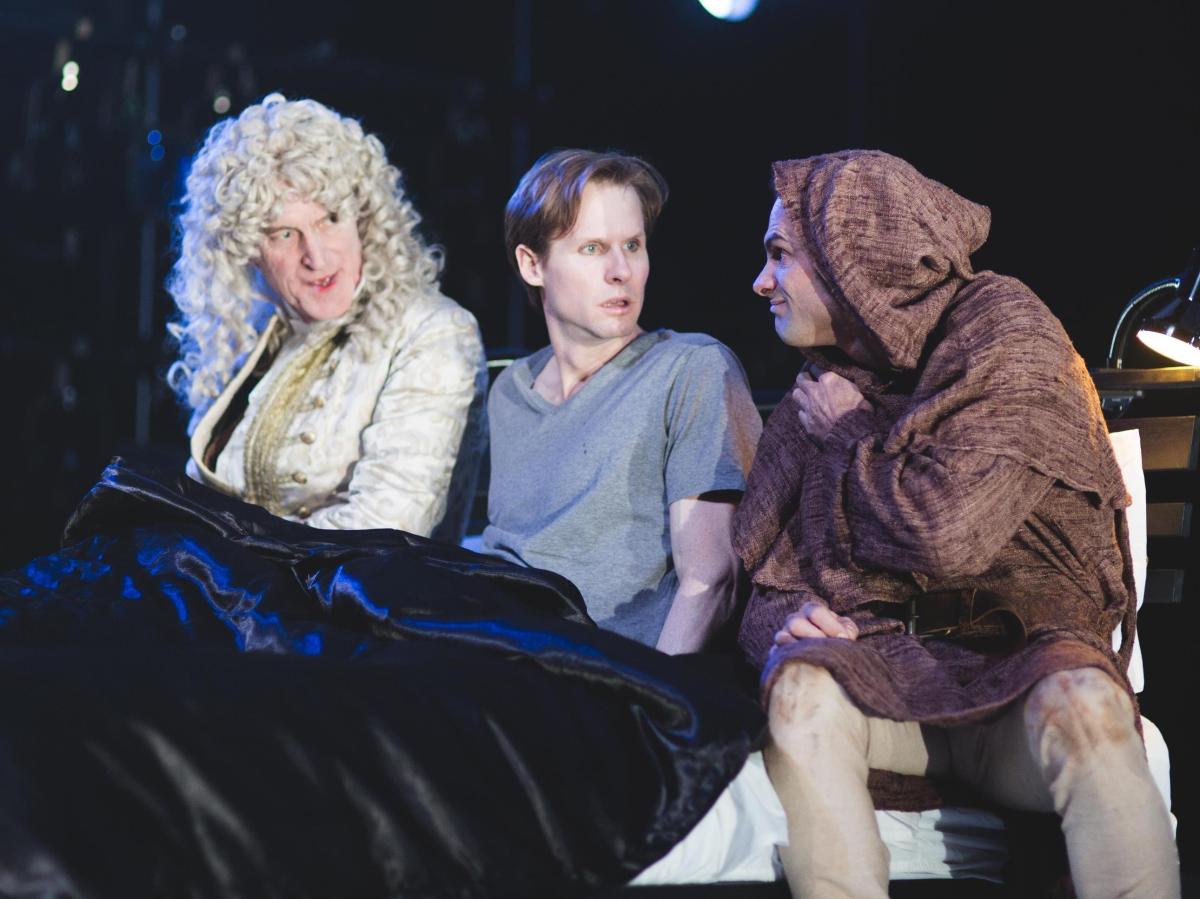Image: John Stanton, Adam Booth, Stuart Halusz in Angels in America: Part One; photograph by Daniel James Grant.
When it premiered in San Francisco (and later on Broadway) in 1992, Tony Kushner’s Angels in America brought with its dramatic ringing of the death knell – a feeling of liberation and prophesy. It captured layers of zeitgeist in a literary scope – the AIDS epidemic, the end of Reagan’s presidency and the ideological shifts it signaled, the nascent rumblings of global warming, race relations, gay rights, political corruption and perhaps most astutely the moral war between religiosity and secularism that raged and still rages on. It has since been adapted into an award-winning television miniseries, directed by Mike Nichols and starring Al Pacino and Meryl Streep, and inducted by Harold Bloom into the Western literary canon.
Almost 25 years later, it only feels more prophetic, no longer carrying the portends of doom but relics and realities. HIV is a treatable diagnosis; global warming a pressing moral crisis; American politics remains entrenched in Reaganite conservatism (small government and smaller minds) as democratic socialism surges to the fore with a new generation of voters; massive strides in LGBTQ+ rights have been made, but the road ahead remains trepidacious. Does the question of currency remain? Why Angels in America, again, now? If the silver-haired, suited men shifting in their seats at opening night during scenes of two men in bed together and the small puddles of post-intermission empty seats are anything to go by, the timelessness of Kushner’s play and its pressing concerns are not in doubt.
Kate Cherry’s staging of Millennium Approaches, the first part of this long and epic play for the Black Swan Theatre Company, its Western Australian premiere, brings to the fore its verbosity and expansiveness. Angels in America begins with a rabbi front-and-centre before the curtain, eulogising a character we never meet. The curtain falls to reveal a cavernous gulf between two great walls of exposed theatre lights and a bright white roof with a small opening, foreshadowing ascension.
Later, the curtain deepens still to reveal an Antarctic tundra, the dreamscape of the play’s most psychologically unstable character, Harper, the agoraphobic, sex-deprived wife of a closeted Mormon Republican law clerk, played by Jo Morris in a steep decline of neurotic fervour. She is one of five characters whose lives intersect throughout Angels in America, alongside her anxious husband Joe Pitt (Stuart Halusz, also excellent), and the persnickety intellectual Louis Ironson (Will O’Mahony) and partner Prior Walter (Adam Booth), a gay couple whose relationship crumbles as AIDS lays claim on Walter’s life.
This is an economical production spotted with moments that are bigger than life. The journey through the bedrooms, living rooms, bathrooms and streets of New York City is seamless, giving insight into the big problems of this small bundle of lives, a microcosm of the United States of America. The full, two-part play is subtitled A Gay Fantasia on National Themes, and so moments of fantasy crack wide open the hard-won intimacy: the ghosts of Prior Walters of yore visit the present incarnation in his dreams; a Holy Book bursts through the floor and into flames (a semi-comic moment that garners only scattered giggles). The play’s proportion just continues to grow until it outsizes itself, and Cherry’s main challenge is reconciling disparate moments of glory with those of soft-spoken privacy.
For all its fantastic poetry and grandeur – visions from the netherworld and angels falling from the sky, some of it less impressive than it clearly aims to be, some more so – the play’s essence is its dialogue. Long scenes of intricate, rambling dialogue expose the America of 1985, in the throes of political change, writhing in transition between Cold War sentiment and the perceived apocalypse of the approaching new millennium, heralded by the so-called ‘gay cancer’. Park benches, lounges and beds wheeled surreptitiously on stage and dim lights draw focus to the actors, on whom the responsibility to convince falls. O’Mahony as the whip-smart word processor, Louis, bears the brunt of the long, eloquent speeches that chew at the intersection of politics, racism, anti-Semitism and homophobia as they existed then, not to mention the burden of Jewish guilt, and he carries them off convincingly.
Less persuasive is John Stanton’s recalcitrant Roy Cohn, Angels’ devil, a Republican politician who insists on saying that his AIDS diagnosis is liver cancer to protect his reputation. Stanton’s low, raspy and occasionally wobbly NYC accent makes it difficult to hear some of the lines, and some powerful moments and punchlines fall through the cracks along with the paradoxes of the character, perhaps the play’s most difficult. Kenneth Ransom as drag queening nurse Belize is warm and funny, and while chemistry between him and the dying Prior is cracking, he’s not as comfortable with the tightly-wound Louis. Toni Scanlan and Felicity McKay are cleverly utilised in multiple roles: Scanlan wonderful as Pitt’s conservative mother, the spectre of communist spy Ethel Rosenberg, and the kindly old rabbi; McKay a vision as the Angel herself.
There’s the sense that there’s a great play behind this good and faithful interpretation – only fragments of it have the full impact of Kushner’s words, some of its most earnest moments border of queasy, and by the time the sky opens up for its earth-shaking ending its impact feels slightly muted. Still, the three-hour runtime isn’t at all burdensome, and even if some of Kushner’s nuance fails to shine through, his laser focus on social issues blazes bright.
Black Swan’s Angels in America wants us to clamber with it up to the heavens, but in a country still fighting for marriage equality and safer schools, grounded is still a pretty good place to start.
Rating: 3.5 stars out of 5
Angels in America: Part One Millennium Approaches
By Tony Kushner
Directed: by Kate Cherry
Starring: Adam Booth, Stuart Halusz, Felicity McKay, Jo Morris, Will O’Mahony, John Stanton
Heath Ledger Theatre at the State Theatre Centre
May 28 – June 19 2016





